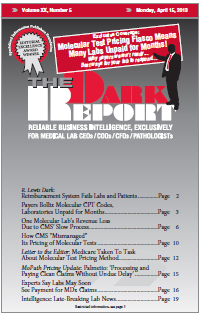CEO SUMMARY: Clinical laboratories complain that implementation of a new payment system for molecular tests has been a disaster since January 1. Most contractors for the federal Centers for Medicare & Medicaid Services have not paid labs for molecular tests billed this year. Billing experts indicate that many commercial plans are not paying either. Groups […]
To access this post, you must purchase The Dark Report.


